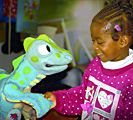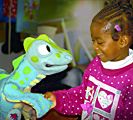How the Well-Baby Program Supports Healthy Child Development

Check out our blog for social-emotional learning articles, news, and more!

 The Incredible Years series is a set of comprehensive curricula targeting children age 2 to 10 years old and their parents and teachers. The curricula are designed to work jointly to promote emotional and social competence and to prevent, reduce, and treat children?s behavioral and emotional problems.
The Incredible Years series is a set of comprehensive curricula targeting children age 2 to 10 years old and their parents and teachers. The curricula are designed to work jointly to promote emotional and social competence and to prevent, reduce, and treat children?s behavioral and emotional problems.
Parent-Training Programs
The Incredible Years Parent-Training program includes four separate components targeting parents of high-risk children or children displaying behavior problems. In all four training components, facilitators use videotaped scenes to encourage group discussion, problem-solving, and sharing of ideas. The "BASIC Parent-Training Program?Early Childhood" (BASIC?Early Childhood) is a core component of the Incredible Years series and includes 12 to 14 two-hour weekly sessions targeting children age 2 to 7 years old. The BASIC?Early Childhood curriculum emphasizes parenting skills to promote children?s social competence and to reduce behavior problems, and it teaches parents how to play with children, help children to learn, give effective praise and incentives, use limit-setting, and handle misbehavior.
The four add-on parent-training components, "Advance Parent Training Program?School Age (ADVANCE)," "BASIC Parent Training Program?School-Age (BASIC-School Age)," "Supporting Your Child?s Education?School Age", and the school readiness supplements "Child-directed Play" and "Interactive Reading" may be offered as supplements to the early childhood BASIC component. ADVANCE targets school-age children 4 to 10 years old and includes eight to ten two-hour sessions that emphasize parents? interpersonal skills, such as effective communication, anger management, problem-solving between adults, and ways to give and receive support. The BASIC?School Age program is similar to the early childhood program but emphasizes strategies for older children, including logical consequences, monitoring, helping children learn to problem solve with children, and family problem-solving. The Supporting Your Child?s Education?School Age component for children age 5 to 10 involves four two-hour sessions and highlights approaches to parenting to promote children?s academic skills, including nurturing reading skills, setting up homework routines, and building collaborative relationships with teachers. The school readiness supplements may be used with parents of 3- to 5-year-olds, and includes an emphasis on building children?s social, emotional and academic skills, as well as fostering pre-reading and reading skills using the interactive reading approach.
Child Training Programs
There are two separate child-training components in the Incredible Years series. The first is the classroom program for children age 4 to 8 years. The Classroom Child-Training program uses the "Dina Dinosaur" curriculum which has more than 60 lesson plans (with preschool, kindergarten and grade one and two curricula), and may be offered over multiple years from preschool to grade two. The program seeks to improve peer relationships and reduce aggression both at home and at school. The curriculum is delivered to the entire classroom by regular teachers, two to three times a week through 20 - 30 minute group discussions followed by small-group practice activities. Home activity manuals encourage parents? involvement in teaching their children school rules, social skills, and problem-solving.
The second child-focused program is the "Dinosaur Child-Training" curriculum, a treatment program for small groups of children age 4 to 8 years who are exhibiting "conduct" problems (defined as high rates of aggression, defiance, and oppositional and impulsive behaviors). The curriculum emphasizes communicating feelings, empathy for others, friendship development, anger management, interpersonal problem-solving, and obeying school rules. The Dinosaur Child-Training program is offered to groups of five to six children in two-hour sessions held weekly for 20 to 22 weeks. The program can be delivered by counselors or therapists to treat conduct-disordered children in small groups, or can be used by schools as a "pullout" program for children with special behavioral and emotional needs.
Teacher Training Program
The training program for teachers emphasizes classroom management skills, such as the effective use of praise and encouragement, proactive teaching strategies, and ways to manage inappropriate classroom behavior and build positive relationships with students. Training can be provided through either four to six full-day workshops or 14 to 20 two-hour sessions.
The BASIC Parent-Training Program?Early Childhood component and the small-group Dinosaur Child-Training program have been rigorously evaluated, and the remainder of this description of the Incredible Years series focuses on these two components. The ADVANCE, BASIC?School Age, Supporting Your Child?s Education, and school readiness parent-training components, the Teacher-Training program, and the Dina Dinosaur classroom curriculum currently do not have sufficiently rigorous research evidence that clearly assesses impacts on child outcomes.
View the report on the Promising Practices Network website
The Promising Practices Network (www.promisingpractices.net) is a Rand Corporation website





